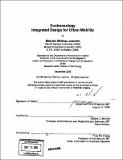Ecotransology : integrated design for urban mobility
Author(s)
Joachim, Mitchell Whitney
DownloadFull printable version (216.0Mb)
Alternative title
Integrated design for urban mobility
Other Contributors
Massachusetts Institute of Technology. Dept. of Architecture.
Advisor
William J. Mitchell.
Terms of use
Metadata
Show full item recordAbstract
This thesis demonstrates a rethinking of urban mobility through ecological design. Human mobility and ecological accountability are inextricably linked in city design; our current world ecological crisis underscores this fundamental connection. Through original design exploration ranging in scale from automobiles to tall building clusters, this work proffers a critical vision towards green urbanism. These conceptions challenge the everyday practices of city planning and design by offering an interdisciplinary framework for design production. The work concludes with the necessity for a new design field entitled "Ecotransology". Ecotransology is still in the nascent stages. It has the potential to become a far-reaching awareness that bonds the disciplines of road ecology, urban design, transportation planning, automotive engineering, and energy consultation. This work establishes the theoretical foundations for Ecotransology in four parts. Part one, Ideation, is a survey of visions on cities illustrating original concepts such as "Gentle Congestion", "Transport User Interface (TUI) Valley Section" and "Netwheels". Part two, Eco, illustrates the principles of ecological design in projects such as "MATscape" and "Fab Tree Hab". (cont.) Part three, Trans, conveys the principles of smart mobility in "Soft Cars" and "Omni-Flocking" vehicles. Part four, Ecotrans, synthesizes these approaches in a series of designs for circulation in bridged tall building clusters such as "PeristalCity". The work describes a burgeoning field, Ecotransology, which promotes ecological transitions within urban contexts. By linking tall building clusters and cars, unique green design proposals for urbanization were produced, which promote a new role in defining the ciphers of future design thought.
Description
Thesis (Ph. D.)--Massachusetts Institute of Technology, Dept. of Architecture, 2006. Includes bibliographical references (p. 402-412).
Date issued
2006Department
Massachusetts Institute of Technology. Department of ArchitecturePublisher
Massachusetts Institute of Technology
Keywords
Architecture.